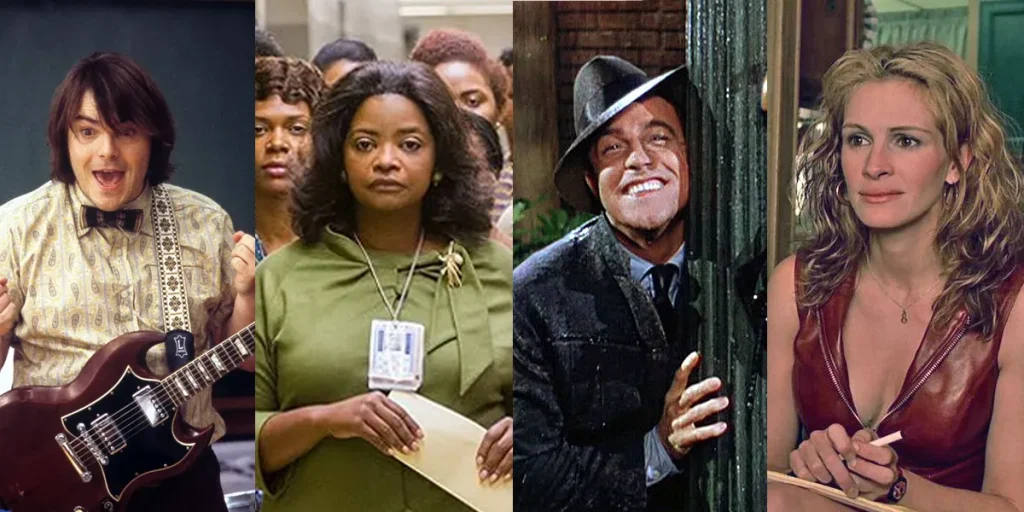These 10 best movies to watch when you feel low offer comfort when you need an emotional pep talk, lifting your spirits when life gets heavy.
Sometimes you need a movie that gets it. Not empty inspiration or manufactured uplift, but something real: films that understand what it’s like to be underestimated, stuck, or just bone-tired of everything. These are the best movies to watch when you feel low: ten films that don’t pretend life isn’t hard, but prove that showing up anyway means something. From Jamaican bobsledders refusing to let a crash be their final word to a secretary from Staten Island claiming her corner office, these picks don’t just make you feel better. They remind you why you’re allowed to take up space, make noise, and want things even when the world says you shouldn’t.
10. Cool Runnings (1993)
Director: Jon Turteltaub
Genre: Sports Comedy, Inspirational Drama
Mood Match: When you need a boost of determination, humor, and joy
Perfect For: Days when you’re feeling defeated or underestimated
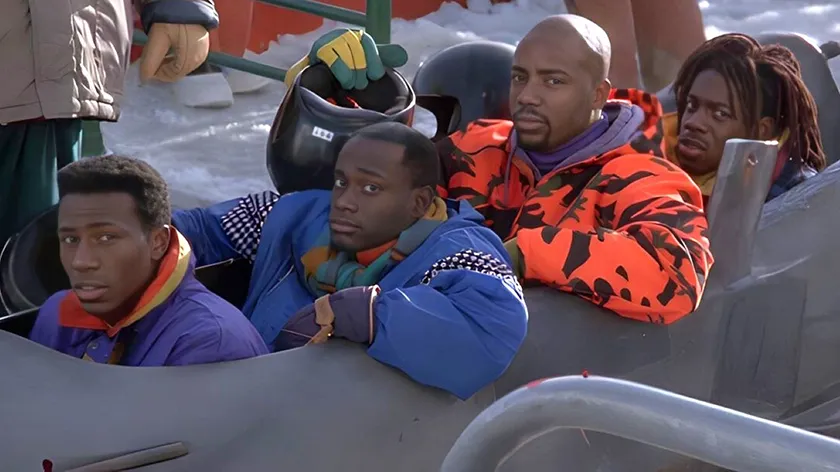
Forget everything you think you know about underdog sports movies. Cool Runnings sneaks up on you. Yes, it’s about Jamaican guys trying to bobsled (the premise alone makes you smile), but Jon Turteltaub crafts something surprisingly profound beneath the comedy. Based loosely on the true story of the 1988 Jamaican Olympic team, the film takes enormous creative liberties but captures something essential about dignity in defeat. The stroke of genius is casting John Candy against type as a disgraced coach carrying real emotional weight. His bathroom mirror scene (“If you’re not enough without it, you’ll never be enough with it”) might be the most honest thing ever said in a Disney sports film.
The film works when you’re down because it never mocks its heroes for failing. When they crash and carry that sled across the finish line while the crowd slowly applauds? That’s not about winning; it’s about refusing to let failure be your final word. Doug E. Doug, Rawle D. Lewis, Malik Yoba, and Leon Robinson have incredible chemistry, making you believe these guys would die for each other. Fun fact: the actual Jamaican bobsled team loved the film despite its liberties with their story, because it captured their spirit perfectly. In an era of cynical sports movies, this one still believes in earning its uplift honestly.
9. The Princess Bride (1987)
Director: Rob Reiner
Genre: Fantasy, Romance, Adventure Comedy
Mood Match: When you want a reminder that love, friendship, and laughter endure
Perfect For: Rainy days, heartbreaks, or when you need to believe in happy endings
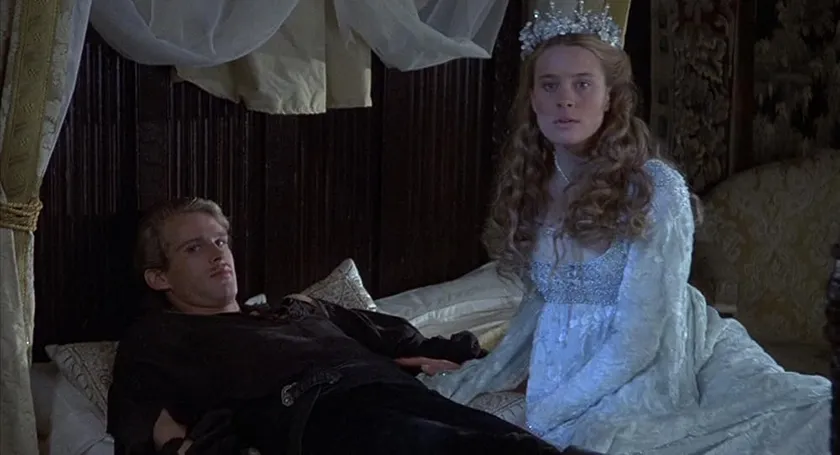
Here’s the thing about The Princess Bride: it shouldn’t work. A fairy tale that constantly interrupts itself, starring a professional wrestler, with a revenge subplot about a guy searching for a six-fingered man? On paper, it’s chaos. But Rob Reiner and William Goldman (adapting his own novel) created something that operates on pure emotional truth wrapped in quotable dialogue. The film bombed on initial release, making only $30 million, but found eternal life through home video and became the ultimate comfort movie for multiple generations.
The magic is in how it acknowledges your cynicism, then gently dissolves it. Peter Falk’s grandfather doesn’t force-feed sentiment; he earns it, just like the movie earns every “as you wish.” When you’re feeling beaten down by the world’s cruelty, watching Mandy Patinkin finally say “I want my father back, you son of a b*tch” feels like cosmic justice. And Cary Elwes and Robin Wright’s chemistry reminds you that true love might actually exist. The film’s secret weapon? It never winks at its own sincerity. Even Andre the Giant, in his only major film role, brings unexpected tenderness. This movie knows exactly how ridiculous it is and commits anyway.
8. School of Rock (2003)
Director: Richard Linklater
Genre: Comedy, Musical, Coming-of-Age
Mood Match: When you’re feeling unmotivated, unheard, or uninspired
Perfect For: Finding your spark, creative slumps, or remembering how fun rebellion can be
Richard Linklater directing a Jack Black kids’ movie sounds like a fever dream, but School of Rock is secretly one of the most radical films about authenticity ever made. Black’s Dewey Finn isn’t just teaching kids rock music; he’s deprogramming them from a lifetime of being told to color inside the lines. The film emerged during the peak of No Child Left Behind standardized testing mania, making its anti-conformity message feel like a necessary rebellion. Linklater, known for talky indie films like Slacker and Before Sunrise, brought his loose, naturalistic style to what could’ve been formulaic family fare.
What kills me every time is watching these kids realize they’ve been hiding their best parts. The shy girl who can sing? The kid everyone ignores who’s a guitar prodigy? They’re not transformed; they’re revealed. And Joan Cusack (perpetually underrated) as the uptight principal who finally remembers she used to love Stevie Nicks? That’s all of us remembering who we were before the world told us to quiet down. The kids actually played their instruments. Linklater held real-life “band practice” for months before filming. When they lose the Battle of the Bands but the crowd demands an encore anyway, the message is clear: authenticity beats perfection every time.
7. Erin Brockovich (2000)
Director: Steven Soderbergh
Genre: Biographical Drama, Legal Thriller
Mood Match: When you feel underestimated or invisible
Perfect For: Days when you need to reclaim your power and voice
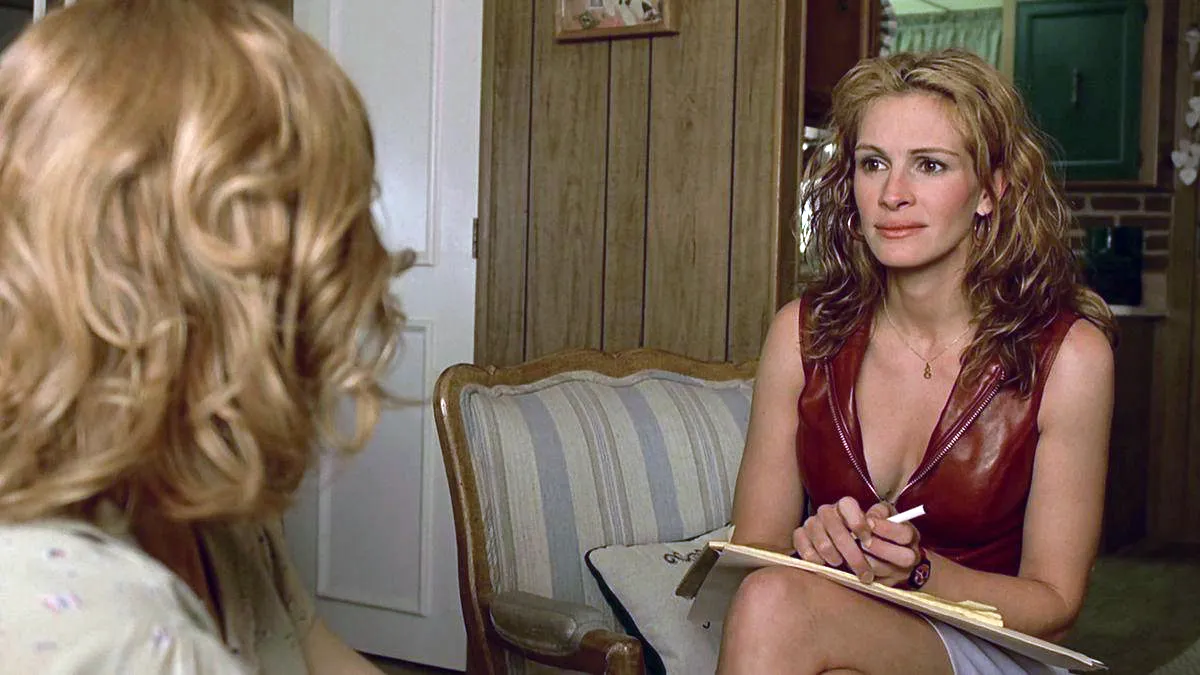
Steven Soderbergh took what could’ve been a TV movie-of-the-week and turned it into a battle cry. Julia Roberts doesn’t just play Erin; she becomes this force of nature who weaponizes every assumption people make about her. Those push-up bras and short skirts? They’re armor, and she knows it. Roberts fought for this role after meeting the real Erin, and her performance is the opposite of Oscar-bait transformation. She refuses to become “respectable” to be taken seriously.
The genius is that Erin never changes for anyone. She doesn’t get a makeover, doesn’t suddenly start dressing “professionally.” She wins by being exactly who she is, a detail that Aaron Eckhart’s biker boyfriend understands but Albert Finney’s lawyer has to learn. When she memorizes 634 plaintiffs’ phone numbers because “they’re people, not numbers,” you realize this isn’t about legal procedure; it’s about giving a damn when everyone expects you not to. The real Erin had a cameo as a waitress named Julia. The film grossed $256 million on a $52 million budget, proving audiences were starving for heroes who look like them, flaws and all.
6. The Martian (2015)
Director: Ridley Scott
Genre: Sci-Fi, Survival Drama, Dark Comedy
Mood Match: When you feel isolated, stuck, or overwhelmed
Perfect For: Reigniting problem-solving energy and believing in the power of grit
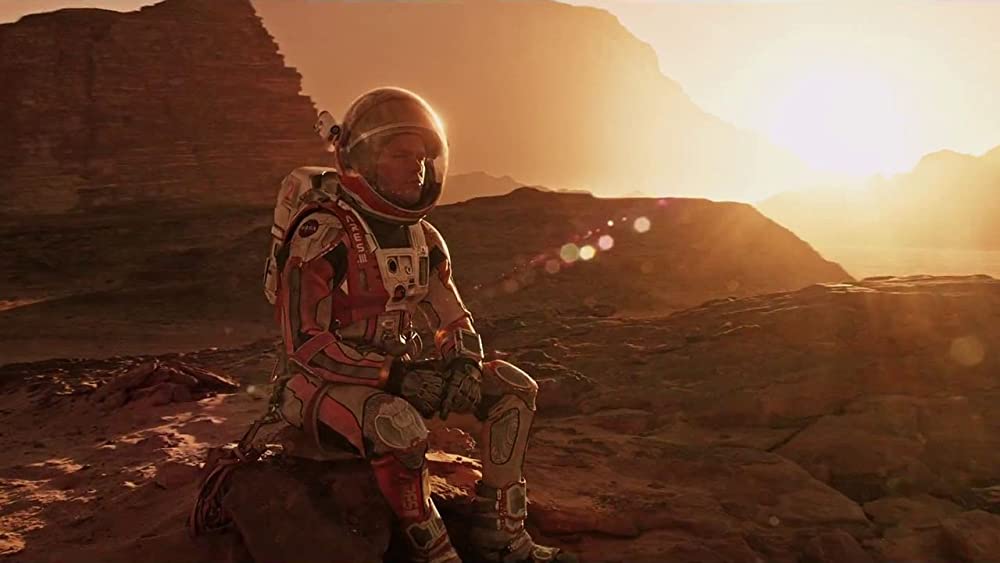
Ridley Scott made a survival film where the hero’s greatest weapon is dad jokes. Think about that. Matt Damon’s Mark Watney is stuck on Mars with a 70s disco collection and potatoes, and somehow that becomes the most optimistic film about human ingenuity ever made. Drew Goddard’s screenplay (from Andy Weir’s meticulously researched novel) treats intelligence as the ultimate special effect. No villains, just problems to solve.
The secret sauce is that Watney never wallows. When everything goes wrong (and it constantly does), he doesn’t give inspiring speeches. He says “I’m gonna science the s*it out of this” and gets to work. It’s problem-solving as therapy. The film respects intelligence without being pretentious. Everyone from Donald Glover’s trajectory specialist to Chiwetel Ejiofor’s mission director gets to be the smartest person in the room at different moments. And that finale, where the whole world stops to watch one person get rescued? In our fractured times, that image of collective human hope hits harder than any superhero team-up could.
5. Singin’ in the Rain (1952)
Directors: Gene Kelly, Stanley Donen
Genre: Classic Musical, Comedy, Romance
Mood Match: When you need pure joy and lighthearted escapism
Perfect For: Grey days, artistic burnout, or a mood-lifting musical reset
Every film student knows this is “the greatest musical ever made,” but that undersells its superpower: this is a movie about everything falling apart, made during a time when everything was falling apart (McCarthy-era Hollywood), that chooses joy as an act of defiance. The film was MGM producer Arthur Freed’s attempt to monetize his old song catalog, but Gene Kelly and Stanley Donen transformed that corporate mandate into pure art.
Gene Kelly was 39, with knees that were killing him, dancing in a manufactured rainstorm with a 103-degree fever. That puddle-splashing number took three days to shoot. But watch it and tell me you don’t believe in pure happiness. The genius is that Kelly’s euphoria comes from love finally working out. After walking Debbie Reynolds home, he’s so full of joy that not even a downpour can dampen it. He has to dance because happiness this pure demands physical expression. The film is supposedly about silent films dying, but it’s really about adaptation: Reynolds (who couldn’t dance before this) literally finding her voice, Jean Hagen playing a villain so funny you can’t hate her, and Donald O’Connor nearly killing himself for “Make ‘Em Laugh” (he was bedridden for three days after). When Kelly swings on that lamppost, he’s not escaping reality. He’s celebrating it.
4. Hidden Figures (2016)
Director: Theodore Melfi
Genre: Biographical Drama, Historical, Inspirational
Mood Match: When you feel unseen, undervalued, or outnumbered
Perfect For: Recharging ambition, celebrating intelligence, and reclaiming space
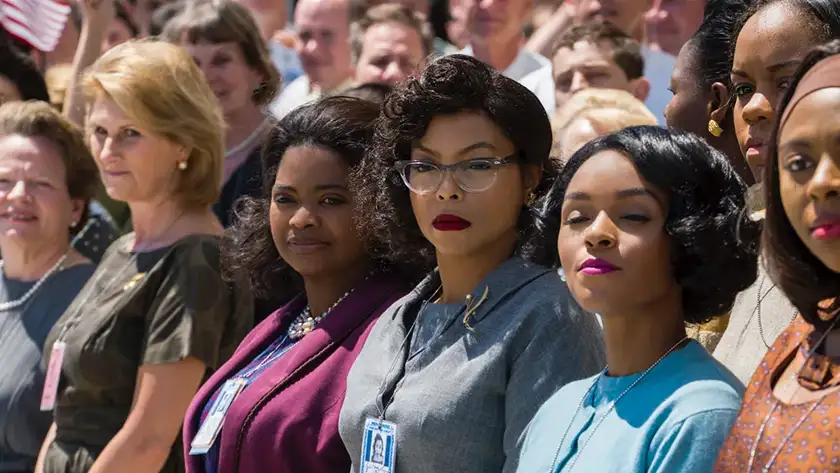
Theodore Melfi knew he was making an important film, but he also knew that medicine doesn’t have to taste bad. Hidden Figures could’ve been a somber historical lesson. Instead, it’s a crowd-pleaser that happens to correct the historical record. The film faced criticism for the fictional white savior bathroom scene, but Melfi defended it as emotional truth over literal fact, showing how these women’s work was so essential that even the smallest obstacles to their productivity became everyone’s problem.
The brilliance is in the details. Taraji P. Henson’s Katherine Johnson running half a mile to use the “colored” bathroom, not as melodrama but as absurdist comedy that slowly reveals its horror. Octavia Spencer’s Dorothy Vaughan teaching herself FORTRAN from a library book she has to steal because she’s not allowed to check it out. Janelle Monáe’s Mary Jackson petitioning a judge with such charm he can’t help but make history. Kevin Costner destroying the bathroom sign isn’t historically accurate, but it’s emotionally true: allies need to literally tear down barriers. The film made $236 million worldwide, proving that stories of overlooked brilliance resonate across all audiences.
3. The Shawshank Redemption (1994)
Director: Frank Darabont
Genre: Prison Drama, Psychological, Inspirational
Mood Match: When you feel trapped, hopeless, or stuck in a long season
Perfect For: Restoring faith in perseverance, friendship, and freedom
Everyone knows Shawshank is great, but here’s what they miss: this is a movie about depression that never uses the word. Andy Dufresne, played with impossible stillness by Tim Robbins, is literally imprisoned by circumstances beyond his control. Sound familiar? The film flopped initially, barely making back its budget, crushed between Forrest Gump and Pulp Fiction. But through video rentals and endless cable airings (Ted Turner called it his favorite film and played it constantly on TNT), it became our collective comfort food.
Frank Darabont (adapting Stephen King’s novella) makes every tiny victory monumental. Getting beer for his fellow inmates. Playing Mozart over the prison speakers. Building a library book by book. These aren’t grand gestures; they’re proof that meaning exists even in meaninglessness. Morgan Freeman’s narration turns exposition into poetry, and that final reunion on the beach in Zihuatanejo? It earned that ending through 142 minutes of carefully constructed hope. The film asks the ultimate question: Do you get busy living, or get busy dying? Twenty years in prison, Andy chose living every single day.
2. The Intouchables (2011)
Directors: Olivier Nakache, Éric Toledano
Genre: Biographical Dramedy, Friendship, Feel-Good
Mood Match: When you feel disconnected, jaded, or in need of human warmth
Perfect For: Rediscovering joy, the healing power of friendship, and laughter in hard places
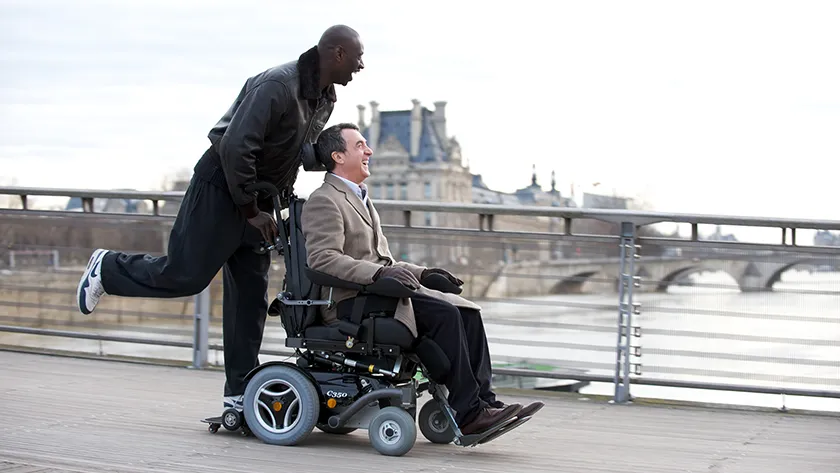
This French phenomenon made $426 million worldwide because it does something radical: it lets disabled people be complete jerks when they want to be. Philippe (François Cluzet) isn’t inspiring or brave; he’s depressed and wealthy. Driss (Omar Sy, in a César-winning performance) isn’t a magical helper; he’s an opportunist who needs a signature for welfare. The film sparked debate about racial dynamics, but Omar Sy defended it as showing two people who see past society’s labels to find genuine connection.
But that honesty is what makes their friendship revolutionary. When Driss pours hot water on Philippe’s legs to prove he can’t feel them, or makes him smoke weed for the phantom pain, it’s shocking because it’s real. No Hollywood film would dare. The Earth, Wind & Fire dance scene isn’t just fun. It’s two men refusing to let circumstances define the boundaries of joy. Based on a true story (Philippe Pozzo di Borgo and Abdel Sellou), it proves that the best medicine is often someone who refuses to treat you like a patient. When Philippe paraglides again at the end, it’s not about overcoming disability. It’s about remembering you’re still allowed to want things.
1. Working Girl (1988)
Director: Mike Nichols
Genre: Romantic Comedy, Workplace Drama
Mood Match: When you feel stuck, underestimated, or overlooked
Perfect For: Fueling ambition, reclaiming confidence, and proving people wrong
Mike Nichols understood something crucial: class warfare is best served with hair spray and shoulder pads. Melanie Griffith’s Tess McGill isn’t just fighting for a promotion. She’s fighting every Staten Island ferry ride, every coffee order, every assumption that secretaries can’t have MBA-worthy ideas. The film arrived during the peak of 1980s excess, but Nichols (fresh off his Heartburn disappointment) wanted to examine who actually gets invited to the party. Griffith, who’d been kicking around Hollywood for years, found her defining role, one that required her to master two completely different voices and physicalities.
The film’s genius move is making Sigourney Weaver’s Katharine Parker sympathetic even as she’s stealing Tess’s ideas. She’s not evil; she’s protecting her territory in a system that pits women against each other. Harrison Ford, as the love interest who actually listens, feels revolutionary even now. That final shot of Tess at her own desk while Carly Simon’s “Let the River Run” soars? It’s not about romance or revenge. It’s about taking up the space you’ve earned. The song won Simon an Oscar, her comeback after years of stage fright had silenced her. Both the film and its theme song insist: your dreams are valid, your ambition isn’t shameful, and that corner office was always supposed to be yours.

